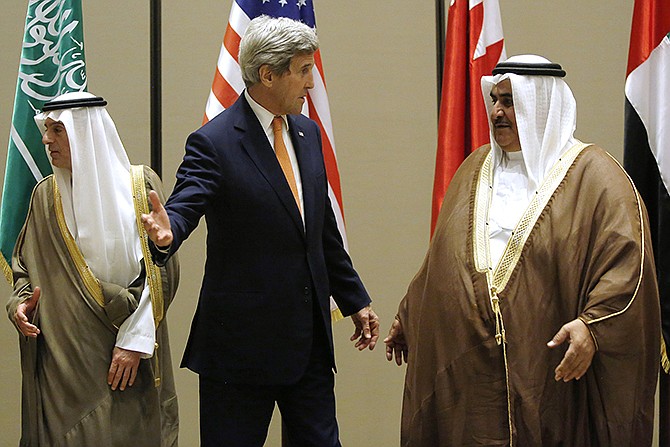MANAMA, Bahrain (AP) - The United States suggested Thursday it was open to a "new arrangement" with Iran for peacefully resolving disputes such as Tehran's recent ballistic missile tests, while America's Sunni allies in the Persian Gulf said Iran must stop sending forces to Syria and weapons to Yemen if it wants to normalize ties with its neighbors.
Setting the stage for President Barack Obama's summit with regional leaders in Saudi Arabia later this month, U.S. Secretary of State John Kerry met with the foreign ministers of the six-nation Gulf Cooperation Council to advance a series of proposals aimed at easing Arabs' concerns about last year's Iran nuclear deal and the warming of ties between the U.S. and Iran. These include providing new counterterrorism, conventional military, missile defense and cybersecurity capabilities.
Kerry raised several other ideas, including a possible partnership between the GCC and NATO to help stabilize the conflict-ravaged Arabian Peninsula. He pledged $139 million in new U.S. humanitarian assistance for Yemen to be doled out over the coming year, but his most interesting suggestion concerned the Iranian ballistic missile activities the U.S. had denounced as violations of a United Nations ban.
A moment after declaring America was united with Persian Gulf countries against the Iranian missile tests, Kerry said the U.S. and its partners were telling Iran that they were "prepared to work on a new arrangement to find a peaceful solution to these issues." He said Iran first had to "make it clear to everybody that they are prepared to cease these kinds of activities that raise questions about credibility and questions about intentions." Kerry didn't elaborate further.
The foreign ministers also addressed the fight against the Islamic State and the region's two deadly civil wars in Syria and Yemen.
But for Saudi Foreign Minister Adel al-Jubeir, the threat posed by Iran was clearly the most pressing concern.
"If Iran wants to have normal relations," al-Jubeir said through an interpreter, "it has to change its policies." He said that includes no more weapons smuggling to countries at peace or war on the Arabian Peninsula, and no more interference in others' internal affairs.
"If Iran continues its aggressive policy," al-Jubeir added, "it will be difficult to deal with Iran."
After touring the U.S. Navy base on the island that hosts the 5th Fleet and supports U.S. maritime activities throughout the Middle East, Kerry highlighted the role of Western interdictions of Iranian weapons shipments. Four have been stopped in the last six months, with the U.S., Britain and France seizing anti-tank munitions, sniper rifles, machine guns and rocket-propelled grenade launchers.
All were believed intended for Yemen's Shiite rebels battling Saudi Arabia, helping reinforce fears among the Sunni kingdoms that Iran is threatening their stability.
While Kerry vowed to "push back" against such Iranian provocations, he also emphasized the Islamic republic's capacity to contribute to peace. He cited Iran's assistance in securing a truce in Syria between the Iranian-backed government and rebels supported by Western and Arab countries. And he called on Tehran to act similarly in Yemen.
The setting of the meeting in Bahrain underscored Arab concerns. The Sunni-ruled, Shiite-majority country is particularly sensitive to Tehran's actions and rhetoric, given its geography just across the Gulf, its demographics and the occasional statements of Iranian officials calling for the country's annexation. Iran is a Shiite power.
At a news conference with Kerry earlier in the day, Bahraini Foreign Minister Khalid bin Ahmed Al Khalifa said Iran must work as hard on restoring relations in the region as it did on securing the nuclear accord. He decried Iran's "hegemonic interventions," yet promised his country would take two steps toward rapprochement for every step by the Iranians.
Making the first visit to Bahrain by a top American diplomat since its 2011 uprising, Kerry tiptoed over the sensitive matter of the kingdom's human rights record.

